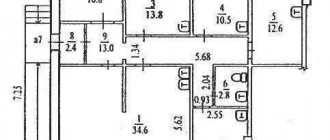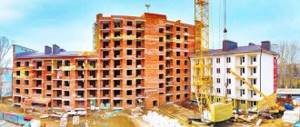Paying extra for “extra” square meters in a new building is a common practice in construction. You buy an apartment, wait for the house to be delivered, and instead of the keys you receive a demand to pay more. Because the housing turned out to be larger in area than the developer planned.
This cannot be said to be illegal - there are regulations that allow the developer to demand money in excess of the amount specified in the contract. But there are nuances - you don’t always have to pay and not in any amount.
We'll tell you how to find out whether you need to pay extra specifically in your case. What options are there if you don’t have to pay, and when should you go to court?
Do you want to profitably buy an apartment in a new building in Moscow or the region? With Avaho, choosing a new building is easy. Free consultation and individual selection of apartments.
Why do “extra meters” appear?
Buying an apartment in a new building is a process that differs from purchasing a secondary home. Even the contracts are different: when you buy a used one, it’s a purchase and sale agreement, when the developer has a share participation agreement.
The fact is that you are not purchasing an apartment, but the right to receive an apartment after the house is handed over, since it has not yet been built. On the one hand, in such transactions the law obliges the developer to comply with hundreds of requirements - the property undergoes a state inspection and only after that is transferred to you. On the other hand, building a house is a complex technological process in which small errors within the norms may be made.
After construction is completed, a final measurement of the house is carried out - usually with the help of the state-owned enterprise Bureau of Technical Inventory.
And in the transfer act they indicate the actual area of the apartment. Example
In your future living room, two walls are 5 m long, and two more are 3 m long. When they were erected, the builders moved them by 10 mm - the common corridor became smaller, and your apartment became larger. This is within normal limits.
But the area of the room increased due to this by 0.16 square meters. m. If you add to this the increase in area in the kitchen and hall, you get almost 1 sq. m.
This is not a hoax - everything is within reasonable errors and standards.
As a result, in the share participation agreement you have one area indicated, but they transfer you another. And the developer asks you for additional payment.
Judicial practice on changing the area of an apartment under an equity participation agreement
Judicial practice on disputes between participants in shared construction and developers arising as a result of the transfer of a construction project with excess or missing square footage is quite contradictory. At the same time, differences in the law of application can be traced not only between courts of different jurisdictions, but also between judicial bodies of different instances, which is largely due to the lack of regulation of DDU in the Civil Code of the Russian Federation.
Despite this, in many ways the courts are also unanimous. Thus, in almost all cases of dispute resolution, the courts are guided by the fact that shareholders do not have the opportunity to influence the progress of construction, while accepting the square footage as the main consumer characteristic of the construction project.
Based on this, many court decisions are aimed at restoring the violated rights of shareholders.
Main conclusions from judicial practice:
- The presence in the DDU of a condition according to which the deviation of the actual area of the apartment from the design one does not entail a change in the price paid by the shareholder in the event of the transfer of an object of smaller area to him, is regarded by the courts as an infringement of the rights of shareholders -consumers, and therefore requires the application of clause 1 of Art. 16 Federal Law “On the Protection of Consumer Rights”. Similar conclusions arise if there are conditions for removing any responsibility from the developer for such deviations.
- Taking into account the peculiarities of construction activities, as well as deviations from design documentation permitted by construction standards, it is recommended to determine the maximum permissible deviations under which the price of the DDU will not be subject to change . plus or minus 1 sq.m as such maximum permissible deviations from the design area .
- In disputes regarding the recovery from developers of amounts of unjust enrichment that arose as a result of a deviation from the project area to a smaller extent, the courts in most cases take the side of the shareholders, satisfying their demands. Guided by the rights of consumers, along with such amounts, interest for the use of funds, penalties for late transfer, moral damages, etc. are collected in favor of shareholders.
- In disputes regarding the recovery of additional payments from shareholders for the provision of larger apartments, the courts proceed from the provisions of the DDU. Thus, if there is a condition in it about changing the price, the courts satisfy the demands of the developers, regardless of the moment of transfer of the apartment to the shareholder. Moreover, referring to freedom of contract, the courts recognize as legal the terms of the DDU on the recalculation of prices based on the results of the inventory, which contradicts paragraph 3 of Art. 16 Federal Law “On the Protection of Consumer Rights”.
The contract specifies payment options
If the developer has made a demand to pay extra, you need to carefully study the contract. Usually there are such situations:
- The minimum and maximum excesses are indicated for which the shareholder, when signing the agreement, agrees to pay. For example, from 0.5 to 3 sq. m. They also write the cost of this meter - as a rule, this is the price for which you purchased the housing, and not the market price at the time of acceptance of the apartment. There are additional payment procedures and deadlines.
- The minimum for which the shareholder does not pay is indicated. For example, if the apartment is 0.5 square meters larger. m, then no additional payment is needed. Anything above that, the developer offers to pay.
- The conditions for additional payment are not specified at all. In this case, the developer sends the shareholder documents from the BTI and an additional agreement to the contract. You are not required to sign it and agree to the additional payment procedure according to the developer’s rules.
If the signed version of the contract specifies the procedure and amount of additional payment, then the developer has a better chance of getting money from you.
When the contract states that if the real area increases (from that specified in the contract), the shareholder must pay extra, there should also be a reverse right - if after payment it turns out that the area is real, the developer will have to return the money.
If there is only mention of the obligation of the shareholder, and not of the developer, there is a chance that the entire condition will be declared invalid in court.
Expanding living space
When all the documents are in hand, you can safely begin redevelopment. It is quite difficult to implement it on your own: you will need the help of a team of specialists. It is necessary to pay special attention to the choice of contractor, because his competence in the future will determine how comfortable life will be in the extended apartment.
Complete turnkey apartment renovation
- Everything is included The cost of repairs includes everything: work, materials, documents.
- Without your participation After agreeing on the project, we only bother the owners when the repairs are completed.
- The price is known in advance. The cost of repairs is fixed in the contract.
- Fixed repair period Turnkey apartment renovation in 3.5 months. The term is fixed in the contract.
Read more about Done
There are many options for arranging a new residential area. You can choose the optimal one, guided by the condition of the walls from which you have to start, the purpose of the room and your aesthetic preferences. For example, in the kitchen, instead of the eliminated window opening, you can install a bar counter or simply place an additional countertop there, organizing an additional work surface. For small kitchens in one-room apartments, this is the optimal solution.
It is convenient to equip a sleeping place on the former loggia, or place a wardrobe or bookcase there. You can also set up a workspace in a small room: with proper thermal insulation and noise protection, working there will be quite comfortable.
Source: tpostroysia.ru
There is no clause on additional payment for increasing the area
If the contract does not include a clause on increasing the price, then you are not obligated to pay.
The developer may try to get payment - in such a situation, shareholders are usually offered to enter into an additional agreement, which spells out the procedure for increasing the price. You are not required to sign this agreement, and the developer cannot refuse to transfer the apartment to you, according to Art. 4 Federal Law No. 214.
If he refuses, you need to go to court with a claim to declare such actions of the developer illegal. In such a situation, it is better to ask a specialized lawyer for help.
Is it possible to change the price under a share participation agreement?
According to the provisions of Art. 5 of Federal Law No. 214 of December 30, 2004, the price of a shared participation agreement (DPA) is considered to be the amount of money payable by a participant in shared construction in favor of the developer.
Such a price is determined in the agreement before its conclusion, is, as a general rule, unchanged and is paid in the prescribed manner.
The provisions of paragraph 2 of Art. 5 Federal Law No. 214 determines the possibility of changing the price of the DDU after its conclusion.
Thus, a change in price is carried out on the condition that it is allowed when this is indicated in the contract, the procedure for such a change is determined, the cases allowing it and the conditions under which it will be made.
In this case, the price change is formalized by a separate agreement of the parties.
Features of the procedure for changing the contract price:
- The conclusion of an agreement is unacceptable without the expression of the will of at least one party. Ignoring such a requirement and unilaterally changing the price will be considered a unilateral change in the DDU, which directly contradicts Art. 310 of the Civil Code of the Russian Federation.
- In addition, the contract cannot provide for the possibility of unilateral price changes on the part of the developer. The presence of such a condition will contradict paragraph 1 of Art. 16 of the Federal Law “On the Protection of Consumer Rights”, as infringing on the rights of the shareholder , in comparison with Art. 310 GK. Therefore, such provision will be void.
- According to paragraph 1 of Art. 452 of the Civil Code of the Russian Federation, an agreement to amend must be made in the same form as the agreement itself. Thus, based on paragraph 3 of Art. 4 Federal Law No. 214, an agreement between the parties to the DDU to change its price must be drawn up in a written document and also registered with Rosreestr.
Is it possible to return part of the money when receiving an apartment of a smaller size?
According to Art. 7 Federal Law No. 214, the developer’s responsibilities include the obligation to transfer to the shareholder a shared construction project, the quality of which corresponds, among other things, to the design documentation. If a shared construction object is created by the developer with a deviation from the terms of the contract, and this makes the object unsuitable for use, this gives the shareholder the right to a proportionate reduction in price .
If such inconsistencies do not make the construction project unsuitable, then the provisions of Art. 29 Federal Law “On the Protection of Consumer Rights”, which allows you to demand a proportionate reduction in price if deficiencies in the work performed are discovered.
At the same time Art. 5 Federal Law No. 214, makes the possibility of reducing the price of a shared construction contract dependent on the presence in it of a condition regulating the possibility of changing such a price, as well as defining the cases in which this is possible.
Based on this, the shareholder must take into account that:
- The possibility of returning part of the funds paid under the DDU, in the case of transfer of an apartment with a smaller square footage under the transfer and acceptance certificate, depends on the presence in such an agreement of an appropriate condition , which implies the possibility of changing the price.
- If there is a condition that allows you to change the price of the contract, the shareholder must enter into an appropriate agreement to change the price. If the developer refuses to enter into an agreement, the funds are recovered in court, as amounts received as unjust enrichment (Article 1102 of the Civil Code of the Russian Federation).
- If there is a condition that exempts the developer from liability for shortcomings of the construction project, expressed, among other things, in the discrepancy between the actual area of the object and the design documentation, they are void (clause 4 of article 7 of Federal Law No. 214).
- If there is no provision in the contract about the possibility of changing the price and transferring the apartment of a smaller area by the developer under the deed, the shareholder has the right to demand the gratuitous elimination of such defects or a proportionate reduction in the price of the contract (Clause 2 of Article 7 of Federal Law No. 214).
- Since such a disadvantage as lack of space cannot be eliminated in practice, the shareholder has the right to refuse to fulfill the agreement unilaterally (clause 2, clause 1, article 9 of Federal Law No. 214). After this, the developer will be obliged to return to such shareholder the previously received funds, along with interest for their use.
Do I need to pay extra to increase the area of an apartment under a shared participation agreement?
The need to make an additional payment for increasing the actual area of the apartment, in comparison with the design documentation, is also due to the initially concluded shared construction agreement.
Thus, if the DDU provides for a condition on the possibility of changing the price, then the developer will have the right to demand that the shareholder enter into an agreement on changing the price, under which he will be obliged to make an additional payment.
The developer does not have the right to demand additional payment without concluding an agreement with the shareholder, since this is a unilateral change in the contract, which is prohibited by Art. 310 Civil Code of the Russian Federation.
At the same time, the developer cannot refuse to fulfill the contract unilaterally, on the basis of the shareholder’s refusal to make an additional payment. In such cases, changes in the contract price are made by applying the developer to the court (clause 2 of article 452 of the Civil Code of the Russian Federation). In this case, the shareholder must take into account that:
- According to paragraphs. 2 clause 1.1 art. 9 Federal Law No. 214, the shareholder has the right to demand termination of the DDU through the court if the shared construction object transferred to him has significant changes in the amount . The law has not established criteria for the “materiality” of such changes, as well as rules that apply to cases where such changes are insignificant.
- Based on clause 9 of Art. 4 Federal Law No. 214, if a shared construction project is acquired by a shareholder not for commercial purposes, then the legislation on the protection of consumer rights applies to the above legal relations.
- So, according to paragraph 3 of Art. 16 Federal Law “On the Protection of Consumer Rights”, the contractor has no right, without the consent of the consumer , to perform additional work for a fee. The consumer has the right to refuse to pay for such work, and if they have already been paid, to demand a refund of the amount paid. Following this logic, shareholders have the right to refuse to pay for the living space of an apartment not provided for in the contract.
- Moreover, according to paragraph 1 of Art. 16 Federal Law No. 214, contract provisions that infringe on consumer rights in comparison with the rules established by law should be considered invalid . Thus, shareholders have the right to refuse to pay for excess space even if there is a condition in the contract obliging them to do so.
In practice, the application of these rules depends entirely on the position of the courts on this matter, which are mostly contradictory, which most often leads to the derogation of the rights of shareholders .
There is an additional payment clause, but you are asked to pay more than 5% of the housing area
Even if the contract agrees on the procedure for additional payment, you are not obligated to pay for any number of square meters by default. m - there is a limit of 5% of the area specified in the contract.
If the construction error is more than 5% of the specified area in the contract, you have the right not to pay for this error, but to demand termination of the contract through the court.
Example
You bought an apartment of 60 square meters. m. After measuring, it turned out that 61 sq. m. were actually built. m. The requirement to pay extra for the extra “square” is legal.
If the apartment has an area of 66 sq. m, additional payment of 6 sq. m will exceed the 5% specified in the law. In such a situation, you can either negotiate with the developer, for example, offer him an agreement - you pay for 3 “squares”, and for another 3 square meters. m no. Or go to court to terminate the contract.
An error of more than 5%, as a rule, can be either in very large apartments or in very small studios. Usually we are talking about 1–3%.
- If the contract specifies the obligation to pay extra for the “extra” area, and it does not contradict the norm of 5%
, it is worth paying extra, otherwise the developer can recover this money through the court. - If there is no obligation in the contract, and the developer asks for money
, you can refuse to pay. In this case, they cannot refuse to transfer the apartment to you. But there is a possibility that the developer will try to demand additional payment from you through the court. - If the norm is exceeded by 5%
, you can demand termination of the contract, return of money and payment of a penalty.
Useful tips
As you can see, remodeling an apartment is a very important undertaking. Therefore, it is better not to take independent actions, but to immediately contact the design office. Here they will help you draw up a redevelopment plan and take care of completing the necessary documents.
Don't contact designers. They are guided more by the wishes of the client than by technical standards. Therefore, after such a redevelopment, problems may arise when selling the apartment.
It is worth noting that for illegal redevelopment, the homeowner faces a fine of up to 4,000 rubles. The liability of legal entities for similar actions is much stricter. In this case, the fine may reach 350,000 rubles.
Options for action when the developer wants to receive an additional payment
It all depends on whether the procedure is specified in the contract and whether the requirements exceed the legal norm.
The contract specifies the possibility of additional payment
If the developer indicated in the share participation agreement the amounts and procedure for additional payment, and they do not contradict the norm of 5%, it is better to pay. After all, when buying an apartment, you signed this agreement and agreed to all its terms.
Ask for installments.
If the surcharge is large, you should try to negotiate an installment plan. It is often more profitable for the developer to agree to split the additional payments over several months rather than waste time and money in the courts.
Ask for another apartment.
You can try to refuse to take an apartment with a larger area and offer the developer to exchange it for one that does not have extra “squares”, so as not to pay extra. This option is real in the case of large developers and in large multi-entrance residential complexes - at the time of commissioning, there are still unsold apartments in such new buildings.
Find flaws in the apartment
, conduct a construction inspection or look for them yourself. A fairly popular option is that the developer wants money from you for the extra meters, and you offer him to compensate for minor shortcomings in the apartment. These could be, for example, problems with sound insulation, insulation or uneven walls - those that are eliminated during repairs.
Bargain with the developer, yourself or with the help of an experienced real estate agency - if we are talking about an additional payment for 1-2% of the area, it is easier for the developer to agree to offset and stop the proceedings.
Order repeat measurements.
There is a possibility that the BTI employees made a mistake and considered something incorrect. Ask the developer for an accurate calculation of measurements; perhaps the area of the balcony and loggia has been added to the area of the apartment without taking into account reduction factors - the “square” of the balcony in such additional payments should be considered as 30% of the cost of the square. m in the contract, and loggias as 50%.
Another mistake in measurements is to include ventilation ducts in the apartment area that protrude from the wall by more than 3 cm.
If the contract does not say about additional payment
If the contract does not contain a clause about the obligation of additional payment and the procedure for this process, then you need to understand the specific situation, preferably with the help of a lawyer from this field.
- On the one hand, you are right, because the order is not spelled out. And you don't have to pay.
- On the other hand, the developer may demand additional payment, the only question is the amount.
The situation is ambiguous, so it’s worth trying to come to an agreement peacefully, for example, by setting off some minor shortcomings in the apartment - like not very straight walls.
If the case goes to court, there are no guarantees that the court will be on your side, since there are no specific rulings on this issue. Therefore, it is impossible to predict which side the court will take.
If the error exceeds 5%, negotiate or go to court
The issue can be resolved peacefully. If you don’t want to pay for the full excess, offer the developer an agreement - you give money for 5% of the excess, and he forgives the “squares” in excess of the norm and gives you the apartment without litigation.
If the developer is against it, you can refuse the apartment. That is, terminate the contract because there has been a significant change - the price has increased by more than 5%.
Along with the refusal of the apartment, demand a penalty - now for individuals this is 1/150 of the key rate of the Central Bank of the Russian Federation for each day of late payment.
Example
The amount for the apartment in the contract is 8 million rubles. Construction took 2 years. It turns out that the penalty will be:
8 million rub. × 731 days × 1/150 × 4.25% = RUB 1,656,933
If the developer refuses to pay, go to court.
Error within the norm - what will happen if you refuse to pay
If the contract specifies the procedure for additional payment and the errors do not exceed 5%, the developer may, through the court, require you to pay for the “extra” area. Plus demand a penalty in the amount of the key rate of the Central Bank of the Russian Federation. For example, if you need to pay an additional 500,000 rubles, and you delayed payment for two months in 2021, then the penalty will be: 500,000 x 60 x 4.25% x 366 days = 3,483.61 rubles.
You can refuse to pay, then the developer will have a reason to go to court. There are no guarantees as to what specific decision the judge will make. The court will determine the exact amount of the surcharge and penalty if you are found obligated to pay.
What is not allowed
Now let's talk about what not to do. Any of the above actions is unacceptable without prior approval.
Violate the integrity of the building
This includes any manipulations with supporting structures, as well as replacing them with lighter partitions. Such actions may cause an increase in load on the floor slabs. Accordingly, the risk of building collapse increases.
To determine which walls are load-bearing, you can be guided by the BTI plan. Load-bearing structures include: inter-apartment, external and walls bordering the landing. They are usually marked on the plan with a bold line or shaded.
Unauthorized use of public communications
This includes installing a “warm floor” system. This design will lead to loss of heat transfer from neighbors. It is worth noting that you cannot install additional taps or switches for public communications.
It is prohibited to carry gas equipment, risers and sewers yourself. When expanding the bathroom, you can move the plumbing at your discretion, while only extending the installed pipes and drains is allowed. Dismantling or moving the installed water supply and sewerage is prohibited.
The same can be said about gas boilers and pipes. If the kitchen renovation involves gas equipment, it is recommended to call representatives of the appropriate service. Gas workers do not tolerate any intrusions into their diocese, so a fine for unauthorized actions is guaranteed.
Combine a room with a kitchen
Some homeowners combine the room and kitchen space by arranging an arch. This is prohibited. Such actions fall under the violation of fire safety standards for the premises.
The maximum that can be done is to install an additional door or window opening between the room and the kitchen. An arched opening is allowed only if the gas stove is replaced with an electric one.
Re-equipment of technical premises for personal needs
If you decide to equip an additional basement or arrange an attic in the attic, you need to legalize your actions. If the selected premises are technical and the re-equipment will block access to utilities, any work in them will be considered illegal.
Additional information: How to legalize the redevelopment of an apartment
Construction of a balcony above the second floor
By adding a balcony to your apartment, you increase the load on the floor slab. In addition, cutting through the balcony door will compromise the integrity of the supporting structure.
Briefly - what to do if the developer asks you to pay extra for the apartment
Any requirement to pay extra for an apartment above the amount specified in the contract is a reason to double-check everything. There is no need to pay immediately, for example, because the other shareholders have decided so.
- Small differences in area, 1-2%, are normal. If the actual area differs by 5% or more, this is not only a gross mistake, but also a violation of the law. And, perhaps, the developer’s cunning or fraud.
- If the difference in area is up to 5% from the indicated one, it is worth paying for these meters.
- If you don’t want to pay, you can bargain with the developer. For example, there is a common practice - the shareholder does not require the developer to level the walls and turns a blind eye to other minor problems at the construction site, and the developer does not demand payment for additional meters.
- When the developer refuses to compromise, order an examination - perhaps there was an error in the measurements.
- You have the right to refuse the apartment if you are required to pay more than 5% of the discrepancies. And demand your money plus a penalty.
When can living space be expanded with a loggia?
If the idea does not involve dismantling important elements for the home, and a technical opinion is easy to obtain first-hand, nothing will stop you from attaching a loggia to the kitchen or bedroom. In panel and brick houses, the window sill block provides the calculated load on the floor, thereby reliably fixing the loggia. If your house is monolithic or monolithic frame, you can safely demolish it. As a rule, this does not cause any damage to the structure.
A small kitchen loggia can be combined with a room without much effort. Permission will still be required, but in this case there is no window sill block at all. You just need to remove the window and balcony door. Such redevelopment is approved in most cases.
Source: mossebo.studio








